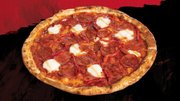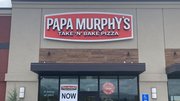News
Avoiding an IRS audit '— legally
The temptation to skim cash in the pizza business is strong, experts say. But the potential damage to one's business — not to mention the risk of an audit — far outweighs any short-term gain.
July 29, 2004
If you think you can take cash from sales out of your register without the tax authorities knowing about it, think again.
Despite the increasing use of credit cards and debit cards, pizza remains largely a cash business. However, the paper trail showing how much revenue should be moving in and out of a pizza business is easily traced back to a pizzeria's suppliers — which is damning evidence easily obtained by the Internal Revenue Service.
Suspecting independent pizza operators in Providence, R.I., were defrauding Uncle Sam, the IRS launched an investigation that resulted in a study called the "Market Segment Specialization Program: Pizza Restaurant," in 1995. In the 50-page report, IRS agents detailed the measures they took to decide whether operators were reporting all their sales truthfully.
By comparing pizza ingredient supplier invoices to ingredients used in audited operations' recipes, the IRS developed estimated sales figures for those operations. Agents determined that, on average, Rhode Island pizza operators were "skimming" $700 a week, a sum the IRS believes is conservative.
|
"If just 10 percent of all the independent operators are doing what was found in Rhode Island, that's a huge sum of revenue that the government is not getting," said Tom Kohler, owner of Premier Accounting Services, a Louisville, Ky.-based firm that supplies bookkeeping services for pizza and restaurant companies. "In a cash business like pizza, I think there's a huge potential for defrauding the government. And it's the government's job to secure that revenue source."
While it may appear the IRS is targeting pizza operations, Guillermo Jalil, president of PizzaTax.com, said it's not. Rather the IRS is looking closely at all cash-heavy businesses (such as dry cleaning and vending), and particularly independent operators within those industries.
Why not chains?
"Because the Domino's and the Papa John's of the industry have sufficient controls ... and the IRS has this perception that most independents have sloppy bookkeeping," said Jalil, whose business is in Reading, Pa.
Kohler concurred: "Most of these people who do franchising, especially in the more mature chains, are normally legitimate businessmen, sophisticated restaurateurs. And since franchisees pay a royalty to franchisors, those franchisors are already in there securing those sales. They know what's going on."
Avoiding an audit
Believing that the IRS's pizza operation report is too complicated for some operators to understand, Jalil's company developed a manual he said simplifies it and advises operators on how to avoid being audited. (The manual is available for sale at www.pizzatax.com.)
"What we've done is shown just how far the IRS will go to figure out what your sales should be versus what you reported," said Jalil. "The IRS has an incredible system that enables them to enforce compliance. They do that through a system that they know works."
For example, a pizza operation audit would start with the basics, such as a request to see the books and/or sales records. If sufficient detailed information isn't available — this commonly was the case in Rhode Island, where operators destroyed cash register tapes after a year — the IRS will go to the pizzeria's suppliers to obtain all invoices for products sold to that operator.
The IRS then would ask for dough recipes, toppings amounts, etc., to make usage estimates, and it also will take half-cooked pizzas (or any other menu item) to a lab for detailed ingredient analyses. Once that data is tabulated, the IRS makes a sales estimate based on ingredients used and compares it to the operator's reported figures.
|
Jalil's manual also provides a copy of the questions an IRS auditor will ask.
"We make this manual available to educate the pizza business owner, to make sure their records are accurate, which ensures they're not caught off guard," he said. "By providing the questions and the techniques the IRS uses in the auditing process, we're trying to prevent surprises."
Any information that helps operators run their businesses correctly is good, Kohler said. But owners of well-run businesses will have their numbers straight to begin with. Those who do, he added, shouldn't fear an audit.
"I would think any legitimate pizzeria operator would want to have a comprehensive financial statement every month, one that's timely and accurate," said Kohler, a former CFO of Rally's Hamburgers. "Whether you're operating one unit or 100 units, you need to have that type of internal reporting."
Strong operators know their sales, their food and labor costs, and they compare those numbers regularly to daily, weekly, monthly and annual records. Such diligence, Kohler said, keeps operators aware of whether they're operating profitably and according to their business plan.
"Nothing I would send you on your P&L should surprise you, because the accounting guy is just the confirmation guy," Kohler said. "Cheating ... accounts for a percentage of your sales, so when you're running all those weird numbers, how do you know you're even doing well?"
More pain than gain in skimming
Skimming and underreporting are risky enough, Kohler said, but what many operators don't understand is their short-term gains actually hurt their businesses. Limiting one's tax obligation legally is one thing, but hiding revenues devalues the enterprise in the long run.
"For every dollar they siphon off the top of their business, they're hurting themselves by some multiple of that dollar when it comes time to sell that business," Kohler said. "If they're showing on their tax returns that they're not making much money, how do they turn around and ask someone else to pay some huge multiple? You can't just say, 'I know the business is doing it,' because that's not verifiable to the buyer. ... Ultimately they reduce the value of their business when they go to sell it."
Kohler suspects the number of operators who misappropriate funds out of ignorance is lower than the kindhearted want to believe. Even if the operator doesn't know basic bookkeeping, he generally knows numbers have to be tracked closely.
Plus, the odds against an operator growing his business beyond one unit are greatly increased if he's a sloppy or deceitful bookkeeper. Staff sizes increase, which makes more people privy to questionable information, which is then difficult to keep under wraps. Also, a clear financial history is needed to secure future credit with lenders and suppliers.
For operators who don't know how to run their numbers properly, the IRS suggests basic bookkeeping courses, or for those who can afford it, hire a bookkeeper who knows the particulars of the restaurant business.
Either way, ignorance will not get a lawbreaker off the hook with the IRS, Kohler said, because the government expects more from operators in 2004.
"Some use that old saying, 'I've got money in the check book, so that means I'm OK,'" Kohler said. "But those days are long gone in this business — gone big time."
 ChatGPT
ChatGPT Grok
Grok Perplexity
Perplexity Claude
Claude












